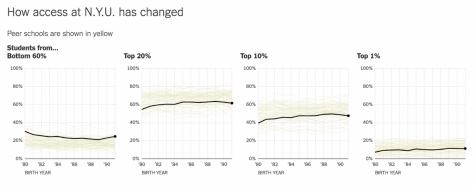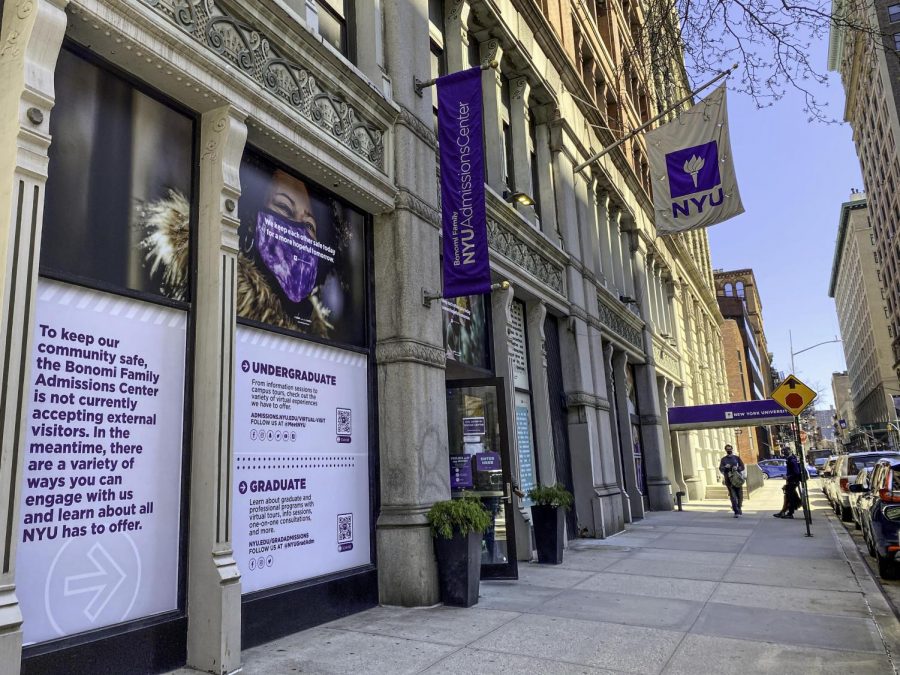Opinion: The story that Netflix’s ‘Operation Varsity Blues’ documentary doesn’t tell
Netflix’s recent documentary “Operation Varsity Blues: The College Admissions Scandal” isn’t the riveting expose it intended to create. The film misses the mark when it comes to making a thought-provoking documentary.
NYU’s admissions statistics show that New York University is no exception when it comes to an elite university admitting disproportionately wealthy students each year, despite boasting itself on its record-setting levels of diversity. Netflix’s documentary about the 2019 college admissions scandal, “Operation Varsity Blues: The College Admissions Scandal,” portrays the scandal as a one-off incident in an otherwise just system rather than a symptom of a national issue. (Staff Photo by Ryan Walker)
April 27, 2021
Last March, a new documentary centering around the 2019 college admissions scandal came to Netflix.
While the docudrama’s lackluster quality and melodramatic reenactments leave a lot to be desired, “Operation Varsity Blues” also completely ignores the reality of the scandal. The documentary frames the case as novel and rare. Even though the specific circumstances of this case are unique, it’s not an exception to the college admissions process in the way the filmmakers make it out to be.
The college admissions scandal involved a web of wealthy parents, including actresses Felicity Huffman and Lori Loughlin. These parents paid Rick Singer to get their children into elite colleges of their choice through bribery and test fraud.
The one highlight of the film was the three minutes where supplemental education and test-prep expert Akil Bello and former Stanford admissions officer Jon Reider discussed test prep culture as a whole. “All standardized testing automatically advantages the people who are already advantaged,” Reider says. This moment successfully contextualizes the scandal in a more meaningful way than any explanation the rest of the film provides.
To start, the original SAT was created by a eugenicist. During an influx of southern and eastern European immigration, Princeton University professor and eugenicist Carl Brigham published “A Study of American Intelligence,” where he concluded that tests he created proved the intellectual superiority of the “Nordic race.” Following the book’s publication, the College Board commissioned him to lead the development of a standardized aptitude test, which became the SAT in 1926.
With a history like this, it’s no wonder that the test has far-reaching repercussions. Reporters from The Washington Post found that higher SAT scores are strongly correlated with above-average household income, increased parental education and the availability of PSAT tests. This reporting shows how wealth, privilege and socioeconomic status beget themselves through standardized tests.
While the College Board touts their tests as accurate indicators of college readiness, their exams actually measure income, which hinders socioeconomic mobility. Those who can pay for tutors for these exams receive better scores.
Beyond admissions exams, wealth is an intrinsic aspect to other factors in college admissions. Talented youth are far more likely to succeed when belonging to a wealthy family, according to a report from the Georgetown Center on Education.
While many students are talented, it takes additional funding to nurture this talent. “People with talent that come from disadvantaged households don’t do as well as people with very little talent from advantaged households.” Anthony P. Carnevale, the report’s lead author, told CNBC.
By looking at NYU’s admissions statistics, it’s obvious that the university is no exception when it comes to an elite university admitting disproportionately wealthy students each year.
Researchers from The Equality of Opportunity Project found that for the class of 2013, 62% of NYU students were part of the top 10% of wealth in America, with just 6.1% of students from the bottom 20%. These rates were consistent for classes over the decade.

Data from the “Mobility Report Cards: The Role of Colleges in Intergenerational Mobility”
report by Raj Chetty, John Friedman, Emmanuel Saez, Nicholas Turner and Danny Yagan.
It is interesting to remember that the NYU athletics department received $338,379 in donations from Rick Singer. In an official statement, though, NYU spokesperson John Beckman noted that the university was not named in the official charges.
When considering how college admissions systems are designed to reward those with access to opportunity, it is easier to see the scandal not as an opportunity to pat ourselves on the back for doing it “the right way,” but as an opportunity for self-reflection as NYU students. It is a chance to be critical of how our own socioeconomic status is entangled with our place in an elite university, just as much as our own talent and hard work. The two cannot be so easily separated.
The scandal, therefore, is more complicated than flawed people who manipulated a system, or, for that matter, a flawed documentary. It’s about flawed people who took advantage of a flawed system that already rewarded them in the first place.
Opinions expressed on the editorial pages are not necessarily those of WSN, and our publication of opinions is not an endorsement of them.
Email Batoul Saleh at [email protected].



























































































































































